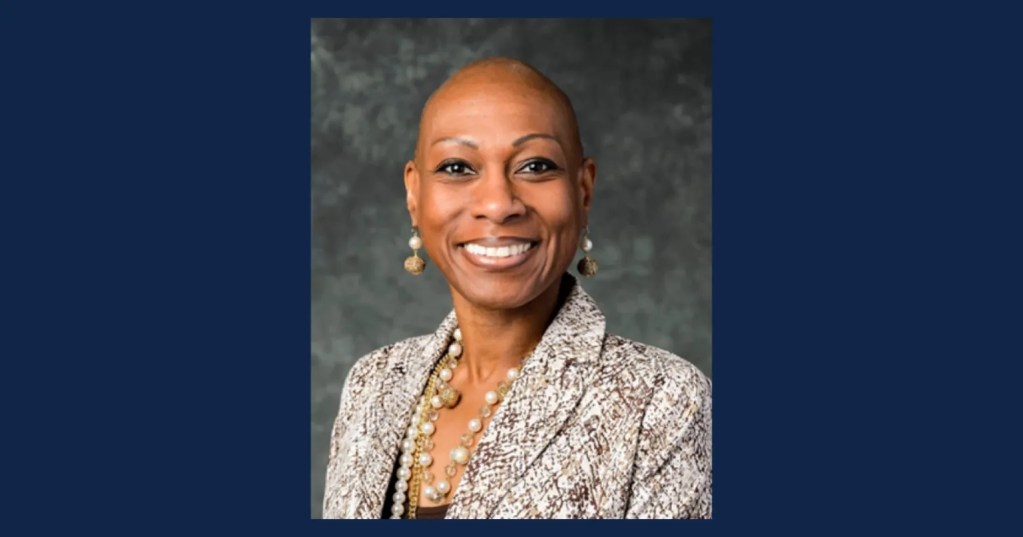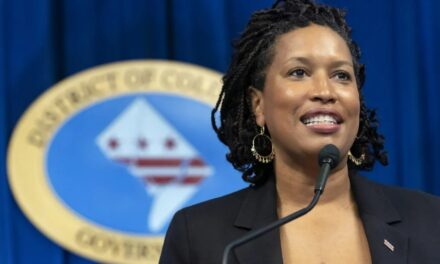By Holly Edgell
The Midwest Newsroom
Antonio Lewis was surprised to see an email from Antoinette “Bonnie” Candia-Bailey in his inbox on the morning of Jan. 8. Lewis, president of the Atlanta chapter of the Lincoln University Alumni Association, had never met Candia-Bailey, but knew she was the university’s vice president for student affairs and an alumna.

After scanning the first few lines of the email, his surprise turned to alarm.
“The first paragraph says, ‘Lincoln, where it all started and where it all ends.’ That paragraph made me alert to what could happen,” said Lewis, who said he immediately sent Candia-Bailey a message via Facebook.
“I said, ‘Whatever you’re doing, please don’t do it. Give me a call.’”
The email came in the form of a letter addressed to Lincoln University President John B. Moseley. Candia-Bailey sent the message from her personal account to family, friends and Lincoln alumni, hours before she died by suicide.
Running more than 10 pages and nearly 6,000 words, the email called out Moseley for a litany of actions that Candia-Bailey said exacerbated her existing mental health condition, which she did not explicitly describe.
“It was a manifesto,” Lewis said. “She was very direct with what she wanted to happen and what had happened to her. She didn’t mince any words.”
In the email, which the Midwest Newsroom has reviewed, Candia-Bailey gives Moseley 18 recommendations for how to improve his job performance as university president. She includes accusations of micromanagement, failure to provide clear directions, inconsistency and arrogance.
She also pointed to jail time, DWI offenses and criminal charges by a key leader on Moseley’s staff–citing case numbers and other details from public records. She said the leader was disruptive and created a toxic work environment.
She outlined several occasions when she talked about her mental health struggles with Moseley and asked for help, only to be rebuffed.
“I think the entire email shows the culture of bullying and go-along-to-get-along, and it is sickening,” Lewis said.
As word of Candia-Bailey’s death and her email spread, blame and criticism grew among alumni and students–most of it directed at Moseley, who fired Candia-Bailey the week before she died. Her termination letter read, in part, that she “was being fired ‘due to your continued failure to appropriately supervise your staff and continued failure to properly supervise the area of student affairs at Lincoln University.’”
Candia-Bailey’s email addresses her firing, admits to mistakes and details the times she tried to work within the university’s processes and seek ways to improve.
Moseley took voluntary paid leave within days of Candia-Bailey’s death, and on Jan. 12, Lincoln University’s Board of Curators announced it would “engage a third-party expert to fully review potential personnel issues and concerns recently raised regarding compliance with the university’s established policies and procedures.”
In response to requests to interview Moseley as well as a representative of the Lincoln University Board of Curators, the Midwest Newsroom received two statements from the university’s marketing and communications department. One is the same statement released on Jan. 12. The second, dated Jan. 18, provided more details about the review. It said the university has hired attorneys led by Ronald Norwood and Jerina Phillips in the Higher Education Practice Group of Lewis Rice in St. Louis to conduct the independent review “of recent issues raised regarding compliance with the University’s established policies and procedures.”
Lewis, a 2011 graduate of Lincoln, is eager to learn what the review reveals. Regardless of the findings, however, he thinks Moseley’s voluntary leave is not sufficient and that he should resign immediately.
He referred to Claudine Gay, who stepped away from the Harvard University presidency in early January amid criticism about her remarks about anti-Semitism and accusations of plagiarism.
“I saw the grace that Dr. Gay showed. She showed a different level of maturity,” Lewis said. “And to see the way that our president is acting shows me the privilege that he thinks he has. I hope he steps down for the betterment of the university.”

Sherman Bonds, national president of the Lincoln University Alumni Association, asked for even more definitive action in a letter he wrote to the Board of Curators president.
“The university’s institutional care has been breached,” he wrote to Victor Pasley. “The present administration has become a liability to the mission and health of the institution. I have become compelled to demand a change to the Office of the Presidency of the university effective immediately.”
Bonds, who earned a bachelor’s degree from Lincoln in 1980 and a master’s degree from the school a year later, told the Midwest Newsroom neither Pasley nor anyone else from the Board of Curators has responded to his letter.
Pasley did not respond to Midwest Newsroom requests for an interview.
On Moseley’s watch
Lincoln University, one of two Historically Black Colleges and Universities (HBCUs) in Missouri, has struggled with funding shortfalls and declining enrollment. In late 2023, federal officials estimated Missouri had underfunded the college, located in Jefferson City, by almost $361.6 million for three decades.
The Missouri Independent reported that Lincoln University’s funding woes grew “over years of the state not meeting its obligation to match federal funds and school administrators dipping into the university’s other revenue streams.”
Lewis said he was dismayed by the way Moseley responded to his questions about securing money for Lincoln University shortly after he took office.
“I immediately gave him a call,” Lewis said. “I said, ‘Congratulations, President Moseley. Now can we work on getting that Lincoln University funding?’”
Lewis said Moseley made a remark that caught him off guard.
“He told me asking for that funding is like asking for reparations.”
Moseley’s university biography touts the securing of the much-needed funding: “For the first time since it was federally mandated in 2000, the University received nearly $10 million, the full state match for its federal land grant funding, in May 2022 and maintained the full funding following the 2023 legislative session.”
Bonds said it’s no accident that Moseley, who is white, was able to do what Black Lincoln University presidents over decades could not.
“African American presidents came through this era where we did not receive this funding,” he said. “The entitlement to the funding was always there. The state just decided to release it on Moseley’s watch.”
Moseley’s biography says he has more than 20 years of higher education experience, “including 14 years on HBCU campuses.” His LinkedIn profile shows few examples of university administration experience, however. It lists an assistant head basketball coach position at North Carolina Central University, followed by the head basketball coach role at Lincoln. From there, Moseley was the school’s athletic director for nearly six years. After nine months as interim president, Moseley officially got the job in 2022.
“He just walked out of the gym and into the president’s office,” Bonds said.
Lewis did not discount Moseley’s experience as a basketball coach or athletic director, but he did question why the Board of Curators selected him for the position in the absence of academic and administrative leadership roles.
“Dr. James Franks was our basketball coach, became our athletic director, became our president,” Lewis said. “He went on to become the first Black man to be the president of the NCAA. And so I’ve seen a basketball coach become a president, and I understand and respect it.”
Lewis said that Moseley’s race was not a key factor in his concerns, pointing out that Lincoln University’s founding president, Richard Baxter Foster, was white. Lewis called Moseley a novice, based on his resume.
Bonds also called Moseley a novice and said the Board of Curators tapped him to lead Lincoln University because he had strong relationships with lawmakers and officials in Jefferson City.
“There was always concern about his ability to mentor faculty and students, to provide direction to others,” Bonds said. “His ability to provide scholarly leadership is limited.”
In her email, Candia-Bailey urged Moseley to get to know the alumni and partner with them for the good of the university. Bonds said that, unlike previous presidents, Moseley seemed uninterested in connecting with alumni, who number thousands around the country and actively fundraise and recruit on behalf of their alma mater.
“Our feedback was not received with any value,” said Bonds, who’s been active in the alumni association for decades. “So we’ve always, from the time that Moseley’s been in the position, been at a position of, you know, feeling that indifference toward what we believe and our input.”
Bonds said the indifference has continued in the wake of Candia-Bailey’s death.
“It would be interesting if the Board of Curators would want to have a listening session with us,” he said. “They said they want a listening session with the faculty and a listening session with the students, but they didn’t say they want a listening session with the alumni.”
A student speaks
On Jan. 12, the day Lincoln University announced the independent review, a group of students gathered outside a Board of Curators meeting, hoping to question leaders about the university’s response and plans.

Photo: Photo courtesy of Kenlyn Washington
“We were just trying to have a conversation just to get some type of answers or just to be heard,” Kenlyn Washington, Lincoln’s Student Government Association president, told local television station KRCG. “When they said, ‘OK, we’re having a closed meeting now,’ it was very frustrating.”
Washington, a political science major from St. Louis, told the Midwest Newsroom she became acquainted with Candia-Bailey through her work in student government.
“She was a great woman,” she said. “She was about her business. She made a significant impact on campus, and she impacted many lives.”
As for Moseley, Washington said he maintained close relationships with student-athletes and athletic department staff but was perceived as “distant,” by the wider student body.
She said a reckoning at Lincoln University is the last thing she expected going into her senior year.
“For everything to happen in such a short period of time and to have this much attention and the spotlight, it’s really been an eye-opener,” Washington said. “But we students continue with the things that we need to get done.”
Among those things, Washington said, is pressing the Board of Curators for information about how Candia-Bailey was treated and her firing.
The Jan. 18 statement from the Board of Curators said, “…we want to prioritize the mental health of everyone here and make sure each employee and student is treated with dignity and respect.”
Like Bonds and Lewis, Washington is ready to see Moseley gone–whether by termination or resignation.
“We should hold everyone accountable on behalf of the student body,” she said.
‘Our university is suffering’
Stevie Lawrence II, Lincoln University’s provost and vice president of academic affairs, is now acting as interim president of Lincoln University. DeNeia Thomas, dean of professional studies, now serves as acting vice president for student affairs, the position Candia-Bailey held until her firing.
The next Board of Curators meeting is scheduled for Feb. 8. Students will be there, Washington said, to take a stand for the university they love.
“For me, coming to Lincoln made me who I am,” she said.
Lewis, who has not visited the Lincoln campus for two years, said he will also be at the meeting in Jefferson City. He’s eager to resume the fundraising and recruiting efforts he suspended during Moseley’s tenure.
“The person I became at Lincoln University is the person I am now,” he said. “I was taught how to speak up in times like this. Our university is suffering.”
Bonds, a special education teacher in Georgia, said he will not attend the Feb. 8 meeting, but he and other alumni will gather in Jefferson City for their annual meeting later in the month. He said the occasion could be an opportunity for university leaders to engage with alumni.
Bonds, born and raised in Sikeston, in Missouri’s rural “Bootheel,” said Lincoln University has long served as a beacon for Black students, and he worries that the school’s current troubles are detracting from its brand and reputation.
“What the whole underpinning of the institution is about is bringing individual students and faculty to a platform that engages them and uplifts them,” Bonds said.
If you’re having thoughts of suicide or self-harm or know someone who is, the 988 Lifeline provides free and confidential support all hours, seven days a week.
This story comes from the Midwest Newsroom, an investigative journalism collaboration including IPR, KCUR 89.3, Nebraska Public Media News, St. Louis Public Radio and NPR.
This article was originally published by Word In Black.
The post Lincoln alumni call for president’s ouster after suicide of Vice President Antoinette “Bonnie” Candia-Bailey appeared first on AFRO American Newspapers.











